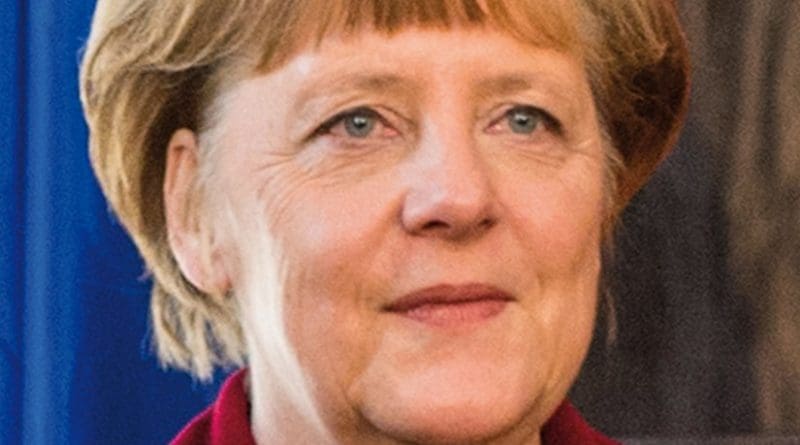Germany: Merkel Points To Coalition With Social Democrats
By EurActiv
(EurActiv) — Chancellor Angela Merkel on Saturday (25 November) welcomed the prospect of talks on a “grand coalition” with her Social Democrat (SPD) rivals and defended the record of the previous such government, saying it had worked well.
Merkel’s fourth term was cast into doubt when the pro-business Free Democrats (FDP) walked out of three-way coalition talks with her conservative bloc and the Greens last Sunday, causing a political impasse in Europe’s biggest economy.
But on Friday, the SPD reversed a previous decision and agreed to talk to Merkel, raising the possibilities of a new “grand coalition” which has ruled Germany for the last four years, or of a minority government.
Addressing party members on Saturday, Merkel argued voters had given her conservatives a mandate to rule in the 24 September election which handed her party the most parliamentary seats but limited coalition options. Her conservatives bled support to the far-right Alternative for Germany (AfD).
“Europe needs a strong Germany, it is desirable to get a government in place quickly,” Merkel told a regional party meeting in northern Germany, adding, however, that her acting government could carry on day to day business.
“Asking voters to go to the polls again would, I think be totally wrong,” she said. On Monday, Merkel had said she would prefer new elections to a minority government in which her party would be only held in power by others.
Without even mentioning the option of a minority government, Merkel said she wanted to look ahead after the setbacks of the last week. Sounding self-assured and drawing applause during her speech, she turned her attention fully to the SPD.
Welcoming the prospect of talks with her former partner, she defended the record of the last coalition.
“We worked well together,” she said, adding under the grand coalition, Germany enjoyed the strongest labour market for decades, a balanced budget and pensioners and families had benefited, she argued.
President Frank-Walter Steinmeier is to host Merkel, SPD leader Martin Schulz and the leader of her conservative CSU sister party for a meeting on Thursday. Steinmeier had exerted considerable pressure on Schulz to change course for the sake of stability in Germany.
Substance
However, no one is saying things will be easy and the two former partners are already jostling over policy.
Merkel said her aims are to maintain Germany’s solid finances, cut some taxes and expand the digital infrastructure.
In a nod to her CSU conservative allies, she also said she aims to limit the number of migrants entering Germany to 200,000 per year.
This, however, may be hard for the SPD to swallow.
“A cap, which may not be called that, breaches the constitution and the Geneva Convention. With the SPD there will be no limit put on family members who want to join asylum seekers,” SPD deputy leader Ralf Stegner told the Funke media group.
Schulz, who had until Friday rejected any deal with Merkel, said there was nothing automatic about the outcome and promised party members a vote on talks.
The SPD is split as many members fear that renewing a grand coalition would be political suicide. It scored its worst result since 1933 in the September election.
Several other leading SPD members have called for other commitments, such as investment in education and homes.
Some senior SPD members have made clear that they will not let Merkel hold them hostage. “Mrs Merkel is not in a position to be setting conditions,” Malu Dreyer, premier of the state of Rhineland Palatinate, told the Trierscher Volksfreund.

